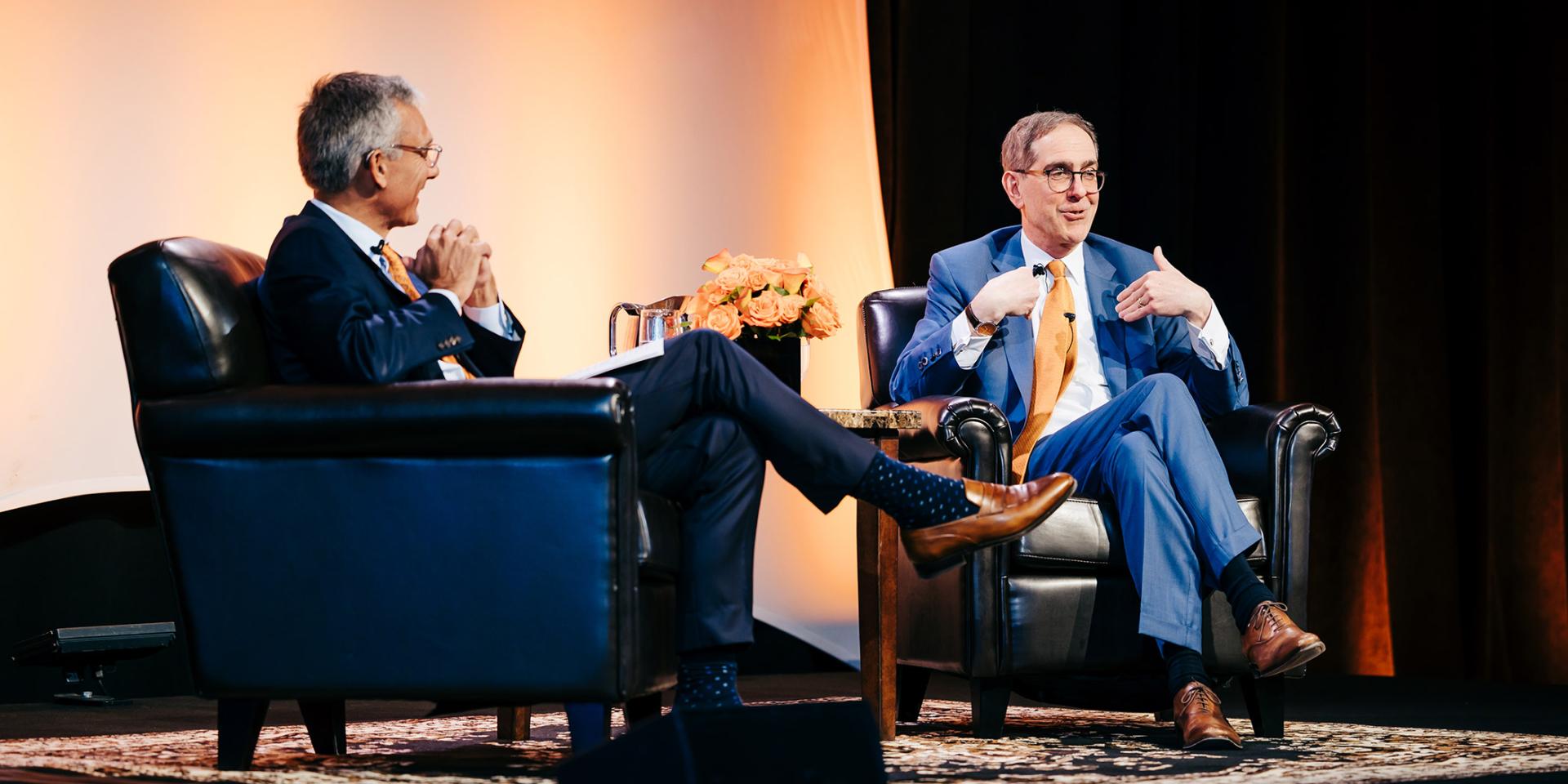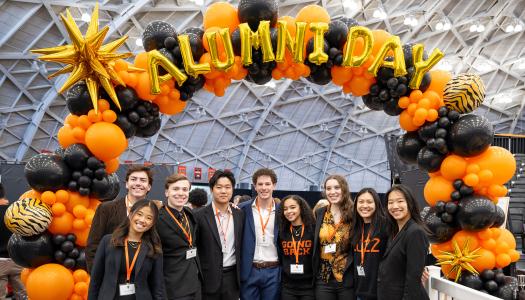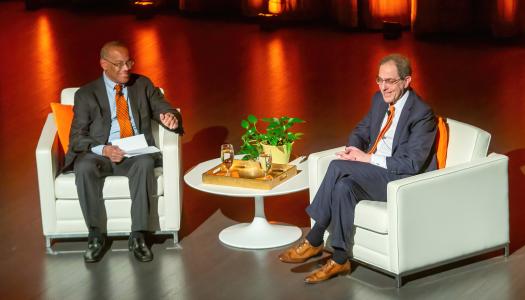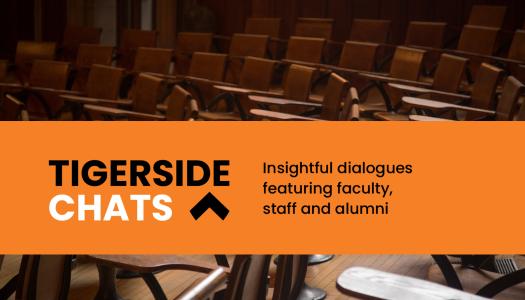Photo by Coastal Click Photography
While campus was blanketed by a February snow, President Christopher L. Eisgruber ’83 visited Princetonians in sunny Florida for a pair of conversations to provide updates on the Venture Forward campaign and the University’s strategic initiatives.
On Feb. 12, in West Palm Beach, Eisgruber spoke with Philip Hammarskjold ’87, Princeton University trustee and executive chairman of Hellman & Friedman LLC. In front of alumni and friends at the Raymond F. Kravis Center for the Performing Arts, they discussed an array of topics, including public perceptions of higher education.
Two days later in Naples, James Yeh ’87, retired president and co-chief investment officer at Citadel, welcomed Eisgruber to the Naples Grande Beach Resort, where their conversation in front of alumni and friends addressed undergraduate and graduate student expansion, and the University’s commitment to inclusivity and excellence.
Both events featured the “Making Audacious Bets” Venture Forward campaign video and an introduction from Alumni Council President Monica Moore Thompson ’89. “What brings us together in person and in spirit year after year is that there’s something we all have in common as Tigers,” she said in West Palm Beach. “Princeton made an audacious bet on who we are and what we would become and accomplish.”
The dual events topped off this year’s Venture Forward tour that also brought Eisgruber to all-alumni gatherings in Hong Kong and Los Angeles.
Here are some of the top takeaways from the two events:
Hammarskjold began their discussion in West Palm Beach by noting that higher education “is on the hot seat” in the political arena, affecting the public’s confidence in higher ed following campus demonstrations related to the Israel-Hamas war. Eisgruber praised the Princeton students and community for maintaining a respectful conversation about the Middle East. “I think the best thing we have going for us are these long-standing relationships that include relationships across difference,” he said. “It’s part of the lifeblood of what goes on on a campus and you are better off … allowing people to speak their minds rather than suppressing what it is they have to say.”
In both West Palm Beach and Naples, Eisgruber addressed the misperception that Princeton and other universities had compromised their mission of excellence to accommodate diversity and inclusivity. “There are people who set up a myth right now saying that universities have chosen between diversity and excellence — that could not be further from the truth,” Eisgruber said in Naples, referencing his recent piece in The Atlantic magazine. “We are better today, stronger than we have ever been, stronger on just about any metric that I could imagine because we are more diverse.”
He pointed to Fei-Fei Li ’00, the 2024 winner of the Woodrow Wilson Award for her contributions to the field of artificial intelligence; Mellody Hobson ’91, co-CEO of Ariel Investments; Anthony Romero ’87, executive director of the American Civil Liberties Union; and Gen. Mark Milley ’80, the retired chairman of the Joint Chiefs of Staff, as Princetonians upon whom Princeton made an audacious bet.
“Part of what we have to do as an institution is think all the time, ‘How do we find more people from more backgrounds who bring excellence?’” Eisgruber said. “Let’s take down the barriers, let’s make sure they can thrive and let’s make sure that they can come to the campus and feel like they belong at Princeton University.”
When asked by Yeh to identify the proudest accomplishment of his tenure as Princeton president, Eisgruber pointed to the expansion of the student body and the accompanying campus construction that is making that expansion possible. “I just feel more Princetonians are better than fewer Princetonians,” he said. “We are turning down roughly 95% of the people who are applying, and anytime we can make a dent in that and take a few more young people who are going to make a difference to our campus, that makes us stronger and increases our contribution to the world.”
Yeh College and New College West opened in 2022, and Hobson College is scheduled to open in 2025, helping grow the undergraduate study body by 10%. Across Lake Carnegie, new housing for graduate students is nearing completion. “Our graduate students have said, ‘If you want us to be succeeding at one of the most demanding graduate programs in the country, the thing we need most is housing that allows us to stay throughout a five-year program,’” Eisgruber said in Naples. “The trustees had the foresight more than half a century ago to realize that at some point Princeton would need to move to the other side of Lake Carnegie, so we’re opening graduate housing there this spring.”
Eighteen campus construction projects are expected to be completed in the next two years, including four new buildings that will bring together environmental science, bioengineering, and chemical and biological engineering to create a new ES + SEAS neighborhood in the heart of campus. “Our engineering school has been pretty spectacular in terms of what it’s achieved, but it’s done it all in a 1962 set of buildings that may have been the best bargain Princeton ever got when we built them,” Eisgruber said. “Engineering has become a fundamental part of what a liberal arts education is, and these buildings are going to allow us to create the engineering school of the 21st century.”
In those new labs and classrooms, the future of artificial intelligence and quantum science will be written. “How are you and the board thinking about Princeton’s role in these fields?” asked Yeh, who like Eisgruber, studied physics at Princeton.
“The amazing thing about both of these fields is how they play directly to Princeton’s strengths in basic research and what we’ve always been known for, going back to the days of Alan Turing, who is at some level the great-great-great-grandfather of today’s artificial intelligence, and quantum entanglement, which was the subject of debates between Albert Einstein and other Princeton physicists in the 1930s,” Eisgruber said in Naples. “The combination of these two things makes it a pretty exciting place for us to be able to invest. For AI, we have announced together with the state of New Jersey that we are planning to host an AI hub that … will grow our connections to the region and to corporate developers of some of this technology.”
“Our provost right now, Jen Rexford, is a Princeton alum and an extraordinary computer scientist who is helping to oversee what we are doing across the University in artificial intelligence and quantum science,” added Eisgruber. “We have this extraordinary stable of young physicists, engineers and chemists, and that’s the next frontier for us in terms of investment. So I expect we will be investing in a big way to create a quantum institute at Princeton.”
During the Q&A sessions at both gatherings, alumni praised the mission of service that was part of their student experience and continues to distinguish a Princeton education. Eisgruber agreed and highlighted the new LENS program, which provides paid summer service internships to each interested undergraduate. “LENS is another thing that’s possible because of what Annual Giving does for us,” Eisgruber said. “Service has always been a part of our ethos and our soul at Princeton, and these students today are even more committed to the idea of service and paying it forward, both in terms of how they think about our University and how they think about the broader world, than my classmates and our generation.”
After the conversations finished, alumni came to the stage to lead the entire assemblies in the traditional singing of “Old Nassau.”



